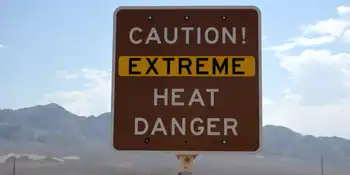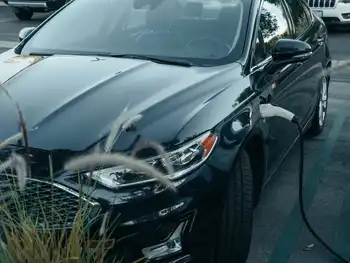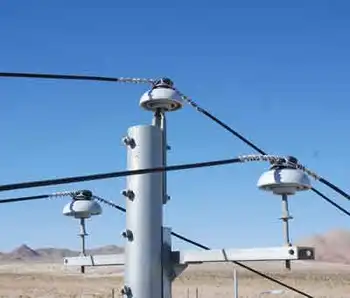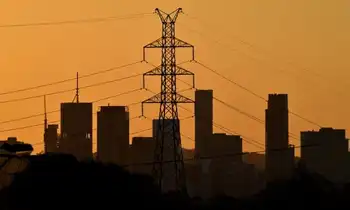Electricity System Climate Resilience underpins grid reliability amid heatwaves and drought, integrating solar, wind, hydropower, nuclear, storage, and demand response with efficient transmission, flexibility, and planning to secure power for homes, industry, and services.
Key Points
Power systems capacity to endure extreme weather and integrate clean energy, maintaining reliability and flexibility.
✅ Grid hardening, transmission upgrades, and digital forecasting.
✅ Flexible low-carbon supply: hydropower, nuclear, storage.
✅ Demand response, efficient cooling, and regional integration.
Summer is just half done in the northern hemisphere and yet we are already seeing electricity systems around the world struggling to cope with the severe strain of heatwaves and low rainfall.
These challenges highlight the urgent need for strong and well-planned policies and investments to improve the security of our electricity systems, which supply power to homes, offices, factories, hospitals, schools and other fundamental parts of our economies and societies. This means making our electricity systems more resilient to the effects of global warming – and more efficient and flexible as they incorporate rising levels of solar and wind power, as solar is now the cheapest electricity in history according to the IEA, which will be critical for reaching net-zero emissions in time to prevent even worse impacts from climate change.
A range of different countries, including the US, Canada and Iraq, have been hard hit by extreme weather recently in the form of unusually high temperatures. In North America, the heat soared to record levels in the Pacific Northwest. An electricity watchdog says that five US regions face elevated risks to the security of their electricity supplies this summer, underscoring US grid climate risks that could worsen, and that California’s risk level is even higher.
Heatwaves put pressure on electricity systems in multiple ways. They increase demand as people turn up air conditioning, driving higher US electricity bills for many households, and as some appliances work harder to maintain cool temperatures. At the same time, higher temperatures can also squeeze electricity supplies by reducing the efficiency and capacity of traditional thermal power plants, such as coal, natural gas and nuclear. Extreme heat can reduce the availability of water for cooling plants or transporting fuel, forcing operators to reduce their output. In some cases, it can result in power plants having to shut down, increasing the risk of outages. If the heat wave is spread over a wide geographic area, it also reduces the scope for one region to draw on spare capacity from its neighbours, since they have to devote their available resources to meeting local demand.
A recent heatwave in Texas forced the grid operator to call for customers to raise their thermostats’ temperatures to conserve energy. Power generating companies suffered outages at much higher rates than expected, providing an unwelcome reminder of February’s brutal cold snap when outages – primarily from natural gas power plants – left up to 5 million customers across the US without power over a period of four days.
At the same time, lower than average rainfall and prolonged dry weather conditions are raising concerns about hydropower’s electricity output in various parts of the world, including Brazil, China, India and North America. The risks that climate change brings in the form of droughts adds to the challenges faced by hydropower, the world’s largest source of clean electricity, highlighting the importance of developing hydropower resources sustainably and ensuring projects are climate resilient.
The recent spate of heatwaves and unusually long dry spells are fresh warnings of what lies ahead as our climate continues to heat up: an increase in the scale and frequency of extreme weather events, which will cause greater impacts and strains on our energy infrastructure.
Heatwaves will increase the challenge of meeting electricity demand while also decarbonizing the electricity supply. Today, the amount of energy used for cooling spaces – such as homes, shops, offices and factories – is responsible for around 1 billion tonnes of global CO2 emissions. In particular, energy for cooling can have a major impact on peak periods of electricity demand, intensifying the stress on the system. Since the energy demand used for air conditioners worldwide could triple by 2050, these strains are set to grow unless governments introduce stronger policy measures to improve the energy efficiency of air conditioning units.
Electricity security is crucial for smooth energy transitions
Many countries around the world have announced ambitious targets for reaching net-zero emissions by the middle of this century and are seeking to step up their clean energy transitions. The IEA’s recent Global Roadmap to Net Zero by 2050 makes it clear that achieving this formidable goal will require much more electricity, much cleaner electricity and for that electricity to be used in far more parts of our economies than it is today. This means electricity reaching much deeper into sectors such as transport (e.g. EVs), buildings (e.g. heat-pumps) and industry (e.g. electric-arc steel furnaces), and in countries like New Zealand's electrification plans it is accelerating broader efforts. As clean electricity’s role in the economy expands and that of fossil fuels declines, secure supplies of electricity become ever-more important. This is why the climate resilience of the electricity sector must be a top priority in governments’ policy agendas.
Changing climate patterns and more frequent extreme weather events can hit all types of power generation sources. Hydropower resources typically suffer in hot and dry conditions, but so do nuclear and fossil fuel power plants. These sources currently help ensure electricity systems have the flexibility and capacity to integrate rising shares of solar and wind power, whose output can vary depending on the weather and the time of day or year.
As governments and utilities pursue the decarbonization of electricity systems, mainly through growing levels of solar and wind, and carbon-free electricity options, they need to ensure they have sufficiently robust and diverse sources of flexibility to ensure secure supplies, including in the event of extreme weather events. This means that the possible decommissioning of existing power generation assets requires careful assessments that take into account the importance of climate resilience.
Ensuring electricity security requires long-term planning and stronger policy action and investment
The IEA is committed to helping governments make well-informed decisions as they seek to build a clean and secure energy future. With this in mind, here are seven areas for action for ensuring electricity systems are as resilient as possible to climate risks:
1. Invest in electricity grids to make them more resilient to extreme weather. Spending today is far below the levels needed to double the investment for cleaner, more electrified energy systems, particularly in emerging and developing economies. Economic recovery plans from the COVID-19 crisis offer clear opportunities for economies that have the resources to invest in enhancing grid infrastructure, but much greater international efforts are required to mobilize and channel the necessary spending in emerging and developing economies.
2. Improve the efficiency of cooling equipment. Cost-effective technology already exists in most markets to double or triple the efficiency of cooling equipment. Investing in higher efficiency could halve future energy demand and reduce investment and operating costs by $3 trillion between now and 2050. In advance of COP26, the Super-Efficient Equipment and Appliance Deployment (SEAD) initiative is encouraging countries to sign up to double the energy efficiency of equipment sold in their countries by 2030.
3. Enable the growth of flexible low-carbon power sources to support more solar and wind. These electricity generation sources include hydropower and nuclear, for countries who see a role for one or both of them in their energy transitions. Guaranteeing hydropower resilience in a warming climate will require sophisticated methods and tools – such as the ones implemented in Brazil – to calculate the necessary level of reserves and optimize management of reservoirs and hydropower output even in exceptional conditions. Batteries and other forms of storage, combined with solar or wind, can also provide important amounts of flexibility by storing power and releasing it when needed.
4. Increase other sources of electricity system flexibility. Demand-response and digital technologies can play an important role. The IEA estimates that only a small fraction of the huge potential for demand response in the buildings sector is actually tapped at the moment. New policies, which associate digitalization and financial behavioural incentives, could unlock more flexibility. Regional integration of electricity systems across national borders can also increase access to flexible resources.
5. Expedite the development and deployment of new technologies for managing extreme weather threats. The capabilities of electricity utilities in forecasting and situation awareness should be enhanced with the support of the latest information and communication technologies.
6. Make climate resilience a central part of policy-making and system planning. The interconnected nature of recent extreme weather events reminds us that we need to account for many contingencies when planning resilient power systems. Climate resilience should be integral to policy-making by governments and power system planning by utilities and relevant industries, and debates over Canadian climate policy underscore how grid implications must be considered. According to the recent IEA report on climate resilience, only nine out of 38 IEA member and association countries include concrete actions on climate adaptation and resilience for every segment of electricity systems.
7. Strengthen international cooperation on electricity security. Electricity underpins vital services and basic needs, such as health systems, water supplies and other energy industries. Maintaining a secure electricity supply is thus of critical importance. The costs of doing nothing in the face of growing climate threats are becoming abundantly clear. The IEA is working with all countries in the IEA family, as well as others around the world, by providing unrivalled data, analysis and policy advice on electricity security issues. It is also bringing governments together at various levels to share experiences and best practices, and identify how to hasten the shift to cleaner and more resilient energy systems.
Related News












